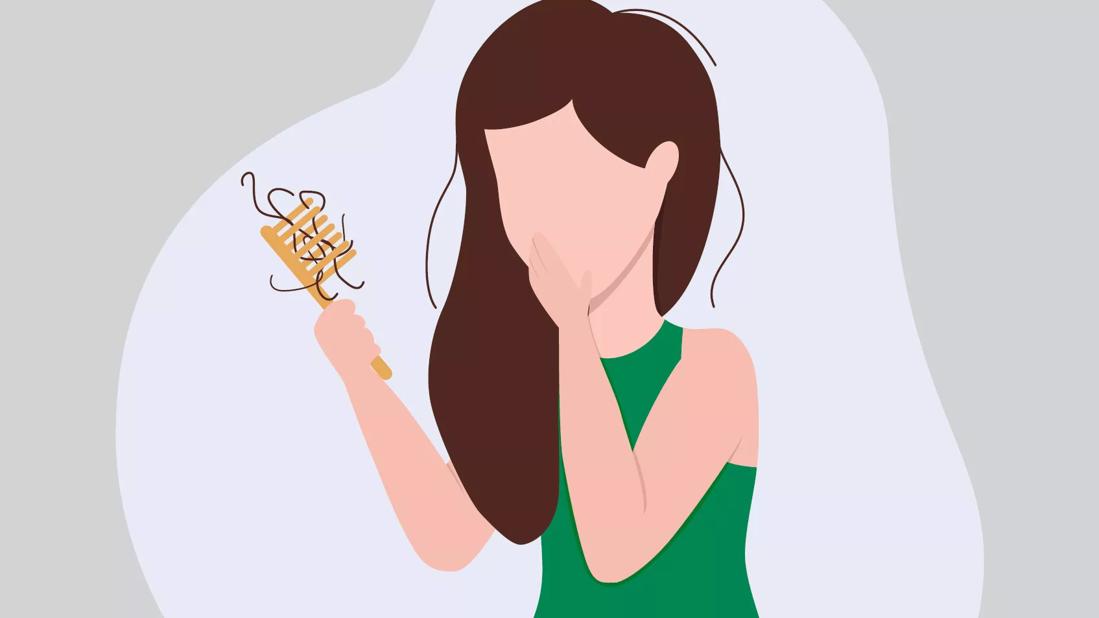Patience is the best solution

Image content: This image is available to view online.
View image online (https://assets.clevelandclinic.org/transform/c9088cad-d325-4af7-8833-50e9fc81845a/PostpartumHairLoss-1266231636-770x533-1_jpg)
An illustration of a person looking at long hairs sticking out of a hairbrush
Your hair grows in cycles. While some of the hairs on your head are actively growing, others are chilling out in a resting phase. Eventually, the hairs in the resting phase fall out, and new hairs sprout in their place.
Advertisement
Cleveland Clinic is a non-profit academic medical center. Advertising on our site helps support our mission. We do not endorse non-Cleveland Clinic products or services. Policy
At different times in your life, this cycle changes. For example, during pregnancy, more of your hair stays in the growth phase. That means your hair often looks fantastic — thick, full and healthy.
However, once you give birth, you could be in for a rude awakening. Now that your baby’s out, your lustrous locks are also on the way out.
When you’re pregnant, your estrogen levels keep increasing, before peaking around the time you give birth. That causes multiple changes to your body, including your hair growth cycle.
“During pregnancy, you aren’t shedding as much hair as you were before,” says Ob/Gyn Erica Newlin, MD. “You may notice you get very luscious, thicker hair.”
But once you’ve given birth, and in the time after, you can expect a steady decrease in estrogen levels. That means these extra hairs finally make their exit — all at once — during the postpartum period.
“After delivery, your body is suddenly catching up, and so the shedding may be way more intense,” Dr. Newlin explains.
This intensity even has a name: telogen effluvium. “In that beginning period, sometimes you can find that you’re pulling handfuls of hair out in the shower,” Dr. Newlin notes. “If you have longer hair, it can be quite noticeable.”
Advertisement
You’ll usually start to experience postpartum hair loss between one and six months after childbirth. Luckily, this condition isn’t permanent. While hair loss can persist for up to 18 months, your hair will bounce back much sooner.
“We generally see hair loss occur within the first year after delivery,” says Dr. Newlin. “The loss peaks in intensity at month four and then tapers off.”
Unfortunately, because it has a hormonal cause, you can’t prevent postpartum hair loss. The only treatment for post-pregnancy hair loss is patience.
Although you can’t prevent postpartum hair loss, you do have the power to make the experience easier while you wait things out.
Folate is a complex B vitamin that offers multiple health benefits, including protecting embryos in the first few months of pregnancy. That’s why taking a prenatal vitamin that contains folic acid, the synthetic form of folate, is so important.
Once you’re given birth, though, don’t ditch the vitamins just yet. “Folic acid can be helpful in helping with further hair and nail growth,” advises Dr. Newlin.
With a newborn (cutely) demanding your time, chances are good you won’t have time to spend hours on your hair. But still be mindful of your haircare routine.
“Think about how you’re styling your hair,” says Dr. Newlin. “Don’t put a lot of heat or chemicals on your hair. If your thinner hair is bugging you, try a new haircut or invest in a volumizing shampoo.”
Avoid tight ponytails or hairstyles that pull very hard on your hair. “Staying away from these hairdos can definitely help decrease the amount of hair loss,” says Dr. Newlin.
In general, it’s good to talk to your doctor before starting to take herbal supplements. That’s especially true — and important — during the postpartum period.
“You can really spend a fortune on herbal supplements, and there hasn’t been a lot of evidence that they work,” says Dr. Newlin. “There’s not some magic cure-all out there. Especially if you’re breastfeeding, you definitely want to check before you’re taking anything because there’s a lot of variance in how well herbal supplements are vetted.”
After giving birth, your life won’t be the same. Your hair might always be a bit thinner now than it was before you became a parent, too. Although, it will grow normally.
You might also be surprised to see hair growing in places other than on your head. During pregnancy, increased levels of androgen hormones can also cause more hair to grow on your abdomen or face. Luckily, this extra fuzz usually goes away by about six months postpartum. Waxing or shaving this hair is a solution if it bothers you.
Advertisement
While postpartum hair loss is normal, medical conditions such as thyroid problems (hypothyroidism and hyperthyroidism) or anemia can cause hair loss. If you feel like you’re shedding a whole lot of hair with no end in sight, mention it to your doctor to rule out other issues.
Advertisement

Sign up for our Health Essentials emails for expert guidance on nutrition, fitness, sleep, skin care and more.
Learn more about our editorial process.
Advertisement
Yes, new fathers can experience mood changes after bringing baby home
But if you’re worried, don’t hesitate to call your doctor or midwife
Heavy bleeding, pain and persistent sadness could be something more serious
Having sex after giving birth isn’t only about being medically ready
It’s normal to experience some changes
Belly wraps provide physical support after you give birth
Sad feelings and teariness that persist are a sign
For some women, periods become problematic
Although it could be used as a moisturizer, this new trend is not recommended
Communicating clear limits helps protect your time, energy and emotional well-being
High cholesterol can be genetic, but testing and treatment can lower your heart disease risk